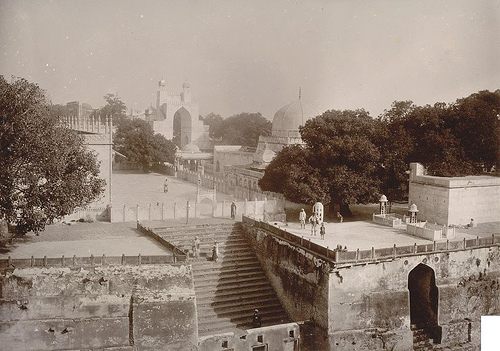In the Name of Allah, The Beneficent, The Merciful
Prayers and Peace upon His Noble Messenger
Laylat-ul-Baraa`ah / Shab-e-Baraat / Night of Absolution
(15th of Sha’baan)
Sha’baan is the 8th month of the Islamic Lunar Hijri calendar. Shaykh Abdul Qadir Jilani (may Allah have mercy on him) writes in his great book, Ghunyatu Talibeen that the angels have two Nights of Festival in heaven, just as the Muslims have two Days of Festival on earth. The angels celebrate the Laylat-ul-Baraa`ah (Night of Absolution), i.e. the 15th of Sha’baan, and the Laylat-ul-Qadr (Night of Power), while the Muslims celebrate the Eid-ul-Fitr (Day of Breakfast) and the Eid-ul-Adha (Day of Sacrifice).
Hazrat Abu Hurayra  (may Allah be pleased with him) reported the Holy Prophet (peace be upon him) as saying:
“Jibreel came to me on the night of mid-Sha’baan and said to me: ‘O Muhammad (peace be upon him), raise your head heavenwards!’ I asked him: ’What night is this?’ and he replied: ‘This is the night when Allah opens three hundred of the gates of mercy, forgiving all who do not make anything His partner. The only exceptions are those who practice sorcery or divination, are addicted to wine, or persist in usury and illicit sex; these He does not forgive until they repent.’
At a quarter of the night, Jibreel came down and said: ‘O Muhammad (peace be upon him), raise your head!’ So I looked up, to behold the gates of Paradise wide open. At the first gate an angel was calling: ‘Good news for those who bow in worship in this night!’ At the second gate an angel was calling: ‘Good news for those who prostrate themselves in worship this night!’ At the third gate an angel was calling: ‘Good news for those who offer supplication this night!’ At the fourth gate an angel was calling: ‘Good news for those who make remembrance this night!’ At the fifth gate an angel was calling: ‘Good news for those who weep this night from fear of Allah!’ At the sixth gate an angel was calling: ’Good news for those who submit this night!’ At the seventh gate an angel was calling: ‘Will anyone ask, that his request may be granted?’ At the eighth gate an angel was calling: ‘Will anyone seek forgiveness, that he may be forgiven?’
I said: ‘O Jibreel, how long will these gates remain open?’ He replied: ‘From the beginning of the night until the break of dawn.’ Then he said: ‘O Muhammad (peace be upon him), tonight Allah has as many slaves emancipated from the Fire as the number of woolly hairs on the flocks and herds of Kalb[1].’â€
Salat ul-Khayr (the Prayer of Benefits)
The ritual prayer traditional for the night of mid-Sha’baan consists of 100 cycles[2] (raka’ah), including one thousand repetitions of Qul huwa Allahu Ahad [Al-Quran: 112] (i.e., 10 recitations in each cycle). The blessings of this prayer are many and varied. Our righteous predecessors used to gather to perform it in congregation. It contains much merit and rich reward. It is reported of Iman
Hasan al-Basri, that he once said:
“Thirty of the Companions of Allah’s Messenger (peace be upon him) related to me that Allah will look 70 times upon one who performs this prayer on this night, and with each glance He will fulfill seventy of that person’s needs, the least of them being forgiveness.â€
Excellence of the Month of Sha’baan and fasting in it
According to Hazrat Abu Hurayra (may Allah be pleased with him), the Prophet (peace be upon him) once said:
“Sha’baan is my month, Rajab is Allah’s month, and Ramadan is the month of my Community. Sha’baan is the expiator, while Ramadan is the purifier.â€
The Holy Prophet (peace be upon him) also said:
“Sha’baan is a month between Rajab and Ramadan. People tend to neglect it but that is when the deeds of His servants ascend to the Lord of All the Worlds, so I would rather mine rose up while I was fasting.â€
Hazrat Umm Salama (may Allah be pleased with her)Â is reported as having said:
“In no other month, apart from Ramadan, did Allah’s Messenger (peace be upon him) fast more often than in Sha’baan. And that was because each Sha’baan, all who must die in the course of that year have their names transcribed from the list of the living onto that of the dead, and a man may embark on a journey even while his name is listed among those about to die.â€
According to Hazrat Abdullah (may Allah be pleased with him), the Holy Prophet (peace be upon him) said:
“Anyone who fasts on the last Monday of Sha’baan will be granted forgiveness.â€
[please note that it is forbidden to fast one or two days before Ramadan.]
Information Source: Hazrat Shaykh Abdul Qadir Jilani’s Al-Ghunya li-Talibi Tareeq al-Haqq (Sufficient Provision for Seekers of the Path of Truth) – Volume 3, pages 54-69
[1] Kalb was a tribe well known for it very woolly sheep.
[2] These can be performed in sets of 2 cycles (50 sets to make 100 cycles) or 4 cycles (25 sets to make 100 cycles)







